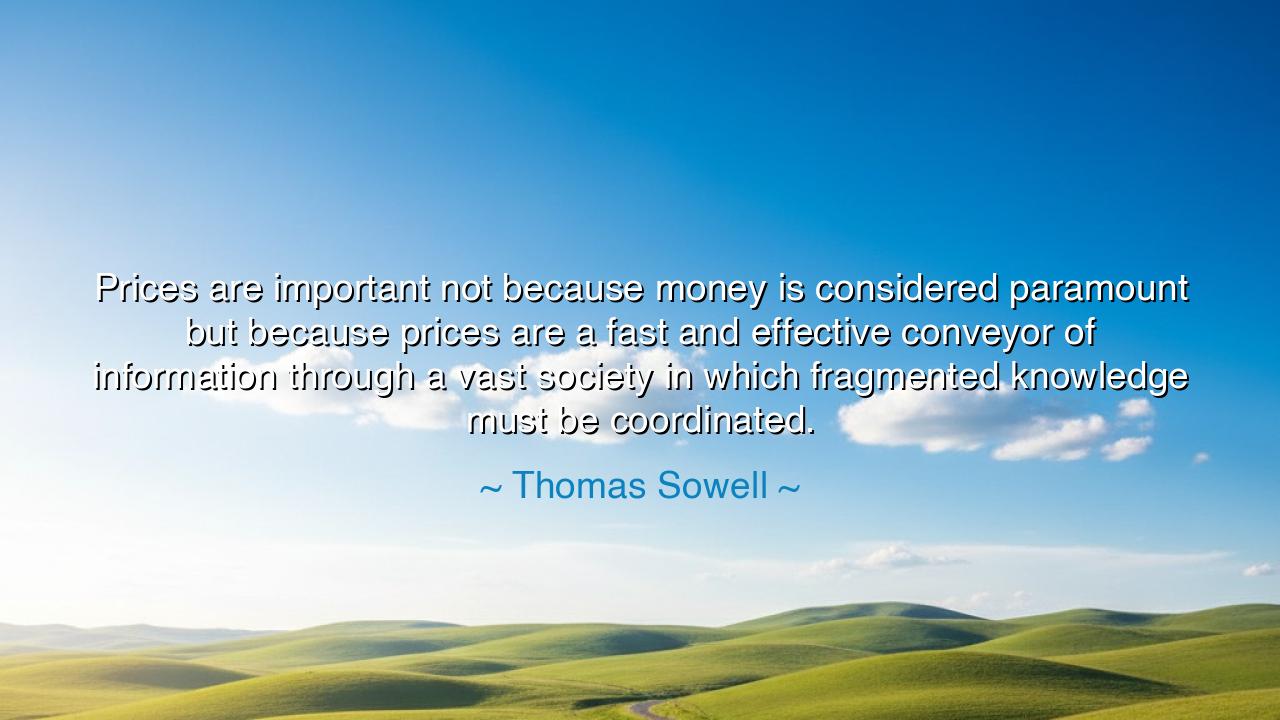
Prices are important not because money is considered paramount
Prices are important not because money is considered paramount but because prices are a fast and effective conveyor of information through a vast society in which fragmented knowledge must be coordinated.






“Prices are important not because money is considered paramount but because prices are a fast and effective conveyor of information through a vast society in which fragmented knowledge must be coordinated.” – Thomas Sowell
In this profound statement, Thomas Sowell, the American economist and philosopher, reveals the hidden wisdom behind the simple mechanism of prices. His words are not about wealth or greed—they are about order and communication within the grand tapestry of human society. For Sowell, the marketplace is not merely a place of exchange, but a living organism where millions of individuals, each holding only fragments of knowledge, unknowingly cooperate to sustain civilization. Prices, he tells us, are the language through which this silent cooperation speaks. They are the invisible messengers that transmit truth about scarcity, demand, and value—truths that no single mind could ever fully grasp.
The meaning of this quote lies in its recognition of the deep humility required to understand the world’s complexity. No government, no scholar, no ruler—however wise—can gather all the information that millions of individuals hold in their separate circumstances. Yet through the mechanism of prices, this dispersed knowledge is unified and transformed into action. When wheat becomes scarce in one region, prices rise—not because someone commands it, but because the invisible threads of human need and limitation pull upon the whole network of exchange. Those higher prices signal farmers to grow more, merchants to ship more, and consumers to use less. Thus, without central control, society achieves coordination through what Sowell calls a “fast and effective conveyor of information.”
The origin of this idea can be traced to the great lineage of economic thought that began with Adam Smith and was refined by Friedrich Hayek—thinkers who saw the economy not as a machine, but as a form of collective intelligence. Sowell inherited this vision and gave it modern clarity. He understood that prices are not moral judgments, nor are they arbitrary numbers; they are signals born from reality—from the limits of resources, from the desires of people, and from the effort of labor. In a sense, prices are the whispers of human civilization, carrying information across oceans and generations faster than any decree or bureaucracy could ever hope to manage.
History offers vivid proof of this principle. In the Soviet Union, where central planners sought to replace the price system with command and control, they found themselves drowning in confusion. Without prices to guide them, factories produced too many boots of the wrong size, too much steel and not enough food. Warehouses filled with goods no one wanted, while shelves in the stores stood bare. What was missing was not effort, nor intelligence, but information—the subtle, ever-shifting signals that prices carry in a free society. The tragedy of planned economies was not simply inefficiency; it was the blindness that comes from silencing the voice of millions.
Sowell’s insight also carries a moral resonance. He reminds us that money itself is not the essence of economics; it is but a mirror reflecting human choices and limitations. The beauty of the price system is that it allows each person—rich or poor, learned or unlearned—to play a part in the great orchestra of production and exchange. Every purchase, every act of saving, every investment sends a note into that symphony. The collective harmony of these notes sustains civilization, ensuring that bread finds the hungry, medicine reaches the sick, and fuel warms the homes of distant strangers.
To understand prices, then, is to understand the humility of our own place within society. We are not omniscient; we depend on the knowledge of others, transmitted through this silent yet powerful network. When governments distort prices—through force, manipulation, or corruption—they break the chain of understanding that holds the system together. But when prices are allowed to flow freely, society becomes wiser than any single planner could ever be. Freedom and knowledge, Sowell teaches, are bound together—one cannot exist without the other.
The lesson of this quote reaches far beyond economics. It teaches us that true order arises not from control, but from cooperation. It calls us to trust in the wisdom that emerges when free people exchange, create, and respond to one another’s needs. In our daily lives, this means respecting the unseen coordination that underlies even the simplest acts—buying bread, turning on a light, drinking clean water. Each of these is a miracle of cooperation, guided by the silent hand of prices and the shared knowledge of countless souls.
And so, let us remember Thomas Sowell’s wisdom: prices are not symbols of greed, but instruments of harmony. They are the pulse of civilization itself, beating with the rhythm of human need and human ingenuity. When we understand this, we see the marketplace not as a battlefield, but as a living network of service—an ever-flowing conversation among millions, each doing their small part to sustain the grandeur of the whole.






AAdministratorAdministrator
Welcome, honored guests. Please leave a comment, we will respond soon